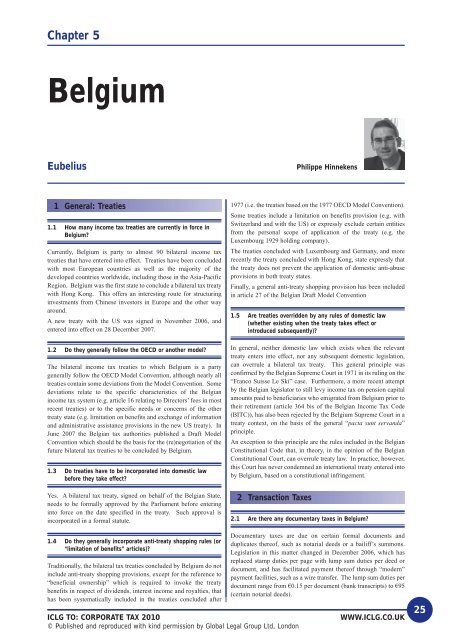Corporate Tax 2010 - BMR Advisors
Corporate Tax 2010 - BMR Advisors
Corporate Tax 2010 - BMR Advisors
Create successful ePaper yourself
Turn your PDF publications into a flip-book with our unique Google optimized e-Paper software.
Chapter 5<br />
Belgium<br />
Eubelius<br />
Philippe Hinnekens<br />
1 General: Treaties<br />
1.1 How many income tax treaties are currently in force in<br />
Belgium<br />
Currently, Belgium is party to almost 90 bilateral income tax<br />
treaties that have entered into effect. Treaties have been concluded<br />
with most European countries as well as the majority of the<br />
developed countries worldwide, including those in the Asia-Pacific<br />
Region. Belgium was the first state to conclude a bilateral tax treaty<br />
with Hong Kong. This offers an interesting route for structuring<br />
investments from Chinese investors in Europe and the other way<br />
around.<br />
A new treaty with the US was signed in November 2006, and<br />
entered into effect on 28 December 2007.<br />
1.2 Do they generally follow the OECD or another model<br />
The bilateral income tax treaties to which Belgium is a party<br />
generally follow the OECD Model Convention, although nearly all<br />
treaties contain some deviations from the Model Convention. Some<br />
deviations relate to the specific characteristics of the Belgian<br />
income tax system (e.g. article 16 relating to Directors’ fees in most<br />
recent treaties) or to the specific needs or concerns of the other<br />
treaty state (e.g. limitation on benefits and exchange of information<br />
and administrative assistance provisions in the new US treaty). In<br />
June 2007 the Belgian tax authorities published a Draft Model<br />
Convention which should be the basis for the (re)negotiation of the<br />
future bilateral tax treaties to be concluded by Belgium.<br />
1.3 Do treaties have to be incorporated into domestic law<br />
before they take effect<br />
Yes. A bilateral tax treaty, signed on behalf of the Belgian State,<br />
needs to be formally approved by the Parliament before entering<br />
into force on the date specified in the treaty. Such approval is<br />
incorporated in a formal statute.<br />
1977 (i.e. the treaties based on the 1977 OECD Model Convention).<br />
Some treaties include a limitation on benefits provision (e.g. with<br />
Switzerland and with the US) or expressly exclude certain entities<br />
from the personal scope of application of the treaty (e.g. the<br />
Luxembourg 1929 holding company).<br />
The treaties concluded with Luxembourg and Germany, and more<br />
recently the treaty concluded with Hong Kong, state expressly that<br />
the treaty does not prevent the application of domestic anti-abuse<br />
provisions in both treaty states.<br />
Finally, a general anti-treaty shopping provision has been included<br />
in article 27 of the Belgian Draft Model Convention<br />
1.5 Are treaties overridden by any rules of domestic law<br />
(whether existing when the treaty takes effect or<br />
introduced subsequently)<br />
In general, neither domestic law which exists when the relevant<br />
treaty enters into effect, nor any subsequent domestic legislation,<br />
can overrule a bilateral tax treaty. This general principle was<br />
confirmed by the Belgian Supreme Court in 1971 in its ruling on the<br />
“Franco Suisse Le Ski” case. Furthermore, a more recent attempt<br />
by the Belgian legislator to still levy income tax on pension capital<br />
amounts paid to beneficiaries who emigrated from Belgium prior to<br />
their retirement (article 364 bis of the Belgian Income <strong>Tax</strong> Code<br />
(BITC)), has also been rejected by the Belgium Supreme Court in a<br />
treaty context, on the basis of the general “pacta sunt servanda”<br />
principle.<br />
An exception to this principle are the rules included in the Belgian<br />
Constitutional Code that, in theory, in the opinion of the Belgian<br />
Constitutional Court, can overrule treaty law. In practice, however,<br />
this Court has never condemned an international treaty entered into<br />
by Belgium, based on a constitutional infringement.<br />
2 Transaction <strong>Tax</strong>es<br />
2.1 Are there any documentary taxes in Belgium<br />
1.4 Do they generally incorporate anti-treaty shopping rules (or<br />
“limitation of benefits” articles)<br />
Traditionally, the bilateral tax treaties concluded by Belgium do not<br />
include anti-treaty shopping provisions, except for the reference to<br />
“beneficial ownership” which is required to invoke the treaty<br />
benefits in respect of dividends, interest income and royalties, that<br />
has been systematically included in the treaties concluded after<br />
ICLG TO: CORPORATE TAX <strong>2010</strong><br />
© Published and reproduced with kind permission by Global Legal Group Ltd, London<br />
Documentary taxes are due on certain formal documents and<br />
duplicates thereof, such as notarial deeds or a bailiff’s summons.<br />
Legislation in this matter changed in December 2006, which has<br />
replaced stamp duties per page with lump sum duties per deed or<br />
document, and has facilitated payment thereof through “modern”<br />
payment facilities, such as a wire transfer. The lump sum duties per<br />
document range from €0.15 per document (bank transcripts) to €95<br />
(certain notarial deeds).<br />
WWW.ICLG.CO.UK<br />
25
















